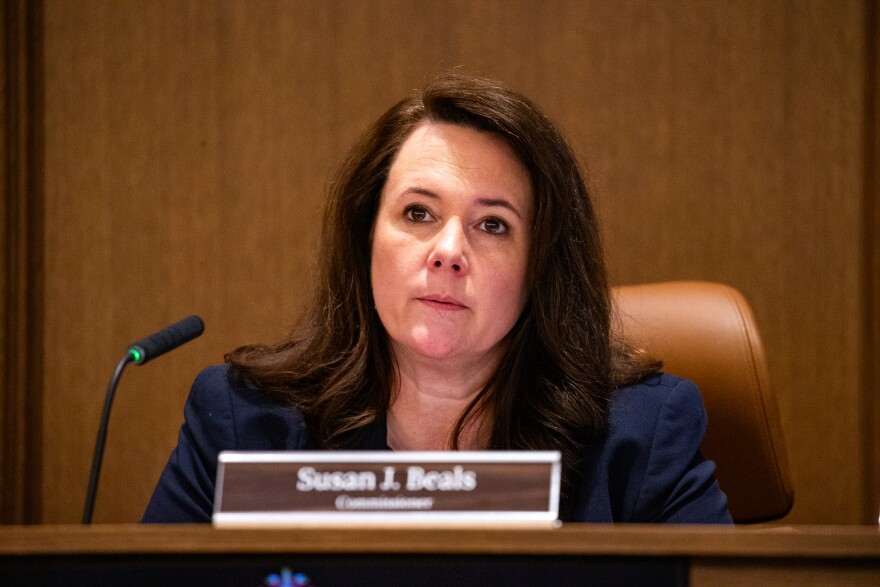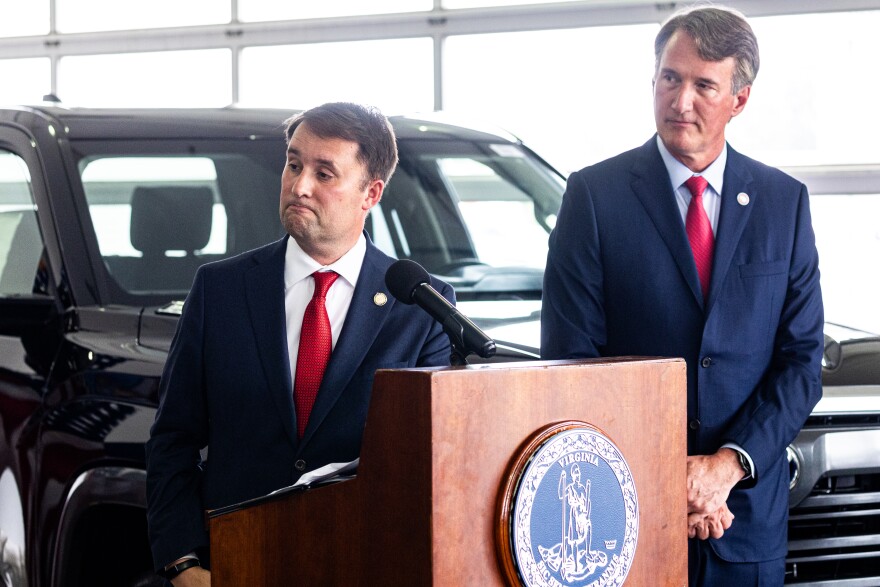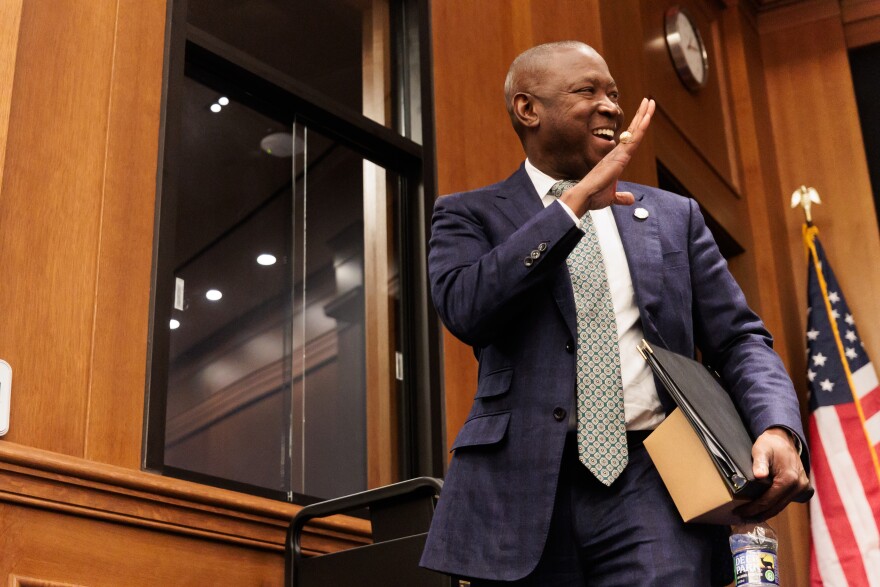A federal judge ruled Virginia must reinstate hundreds of people removed from voter rolls under a recently-adjusted process the state uses to identify registered voters who may not be U.S. citizens.
On Aug. 7, Virginia Gov. Glenn Youngkin ordered that the Virginia Department of Elections (ELECT) and Department of Motor Vehicles run their existing voter list maintenance processes more frequently — sometimes daily. Critics called the order politically motivated.
In response, a group of civic organizations — The Virginia Coalition For Immigrant Rights, The League of Women Voters of Virginia, The League of Women Voters of Virginia Education Fund, and African Communities Together — as well as the U.S. Justice Department sued the commonwealth and various state officials, including Elections Commissioner Susan Beals, Attorney General Jason Miyares and the State Board of Elections.
Both lawsuits argue the process violates a provision of the National Voter Registration Act, which prohibits states from conducting systematic voter roll removals in the 90-day “quiet period” before a federal election. The cases were argued together this week in the U.S. District Court for the Eastern District of Virginia in Alexandria.
On Friday, U.S. District Judge Patricia Tolliver Giles granted the DOJ and the civic groups’ request for a preliminary injunction to pause the program until after Election Day, and to re-enroll the roughly 1,600 people removed from the rolls since Aug. 7.
“This court does not know that all people removed [from the rolls] were noncitizens,” she said. “What the evidence shows is that these are the individuals who failed to return a form attesting they are citizens.”
Youngkin’s order fell exactly 90 days before Election Day 2024.

“The timing is what everything is about,” said Dan Ortiz, Michael J. and Jane R. Horvitz Distinguished Professor of Law at the University of Virginia. “The federal government decided that it was appropriate to not allow states to maintain — and in particular purge — their voting rolls in the days immediately before an election, thinking this could just cause confusion.”
Giles, who was appointed by President Joe Biden in 2021, pointed out that voters must attest to their U.S. citizenship when first registering, which she said meant the DMV’s data is “at best” a conflicting data point. When Deputy Attorney General Thomas Sanford attempted to argue for a stay of the preliminary injunction — citing the state’s belief it has been removing noncitizens — Giles sharply denied his request.
“I’m not dealing with beliefs. I’m dealing with evidence,” she said. “You can sit down.”
The judge ordered Virginia to work with its local general registrars to send out letters to people re-enrolled under her ruling within five days. It affects about 1,600 people, according to data ELECT filed with the court. Ninety-seven people in Chesterfield County had their registrations canceled, along with 293 in Fairfax County, 102 in Loudoun County, 16 in Hanover County, 85 in Henrico County and 61 in the City of Richmond.
One key unresolved detail is whether the people reinstated will be able to vote absentee for Nov. 5’s general election. Friday’s ruling is the same day as the statewide deadline to request an absentee ballot, and Giles appeared inclined to accept Sanford’s concerns that creating an exception after the deadline would cause confusion.
Giles also did not rule on the civic groups’ contention that Virginia’s voter removal process — including outside of the 90-day period before Election Day — is discriminatory based on national origin.
Virginia Attorney General Jason Miyares called the lawsuit “a politically-motivated stunt … challenging a Virginia process signed into law 18 years ago,” and in a statement said Virginia would appeal Giles’ decision all the way to the U.S. Supreme Court.
In a statement Friday, Youngkin pointed out that the commonwealth has conducted its voter roll maintenance procedure in elections since 2006 — under Democratic then-Gov. Tim Kaine — and pledged to appeal. He also called into Fox News and said the ruling was “stunning” and “astounding.”
Republican presidential candidate Donald Trump weighed in on X, calling the decision “a totally unacceptable travesty” and accusing the Biden administration of the “weaponization” of the DOJ.
In Executive Order 35, Youngkin directed Elections Commissioner Susan Beals to certify daily that noncitizens identified through DMV data were being removed from voter rolls. Youngkin’s order added to the chorus of Republicans nationwide raising the specter of noncitizens voting in elections. There is little evidence to show that noncitizen voting is a widespread problem.
Data from the Supreme Court of Virginia does not show any prosecution for noncitizen voting since 2004, two years before the roll maintenance procedure was implemented. The election integrity unit in Miyares’ office has also only prosecuted one election-related offense since it was formed in 2022, which was later dropped.
Youngkin’s order stated that his administration had removed 6,303 noncitizens from the rolls between January 2022 and July 2024. An official with his administration later clarified that number as representing “transactions” — such as the same person making the same error more than once.
Ryan Snow from the Lawyers' Committee for Civil Rights Under Law, who is representing the plaintiffs, said Wednesday that a large portion of the 1,600 removed voters were in fact eligible to vote — and that voter registration applications were denied under the new processes.
In a filing Thursday, the plaintiffs provided stories of what they called eligible voters who were removed from voter rolls. Those included a “lifelong Republican” from Henrico whose registration was canceled in September because she had left the box for citizenship status unchecked.
Lawyers for the plaintiffs also pointed to statements from general registrars in Prince William and Loudoun counties discussing local impacts of the Virginia program. In public comments to the Prince William electoral board, General Registrar Eric Olsen said his office had been required by the state program to cancel 43 registered people, despite indications they were citizens.

It would not be the first time large numbers of eligible voters were removed from voter rolls by Youngkin’s administration: Last year, VPM News first reported that Virginians whose voting rights had been restored after a felony conviction had been removed from the rolls. At the time, ELECT initially denied the reported problem, then later estimated that it had impacted fewer than 300 people. The final tally, also from ELECT, was close to 3,400.
The National Voter Registration Act, commonly known as the “Motor Voter Act” because it mandates that voter registration be available at the DMV, prohibits “systemic” removal of voters. It does allow for individualized removals of people not eligible to vote.
That distinction is at the center of arguments filed by attorneys on both sides. It also follows a developing pattern of litigation across the U.S. according to Bryan Tyson, a Georgia election lawyer who advised Virginia Republicans on the 2021 redistricting commission.
“The litigation, as focused on that [“quiet”] period more recently, has raised the question of what is truly systematic list maintenance and what is not,” he told VPM News. “That’ll be a good argument for Virginia to explain why they believe it's individualized, because it is daily. It is relying on information that's coming from the voter on a regular basis.”
Under both versions of Virginia’s process, the DMV regularly sends a list of people who checked a box indicating they are not citizens during routine transactions to ELECT, which then compares the list to the state voter database for possible identity matches based off of Social Security number, first and last name or last name and date of birth.
ELECT sends those possible matches to local registrars, who conduct an additional check to match the DMV’s information to individual voters. Finally, the state voter database generates a form letter to request the voter in question affirm U.S. citizenship within 14 days or have their registration canceled.
Though less frequently, the process had been conducted monthly until Youngkin’s executive order. The original 2006 law was cleared by the U.S. Justice Department — but that did not bar litigation later, the department’s voting rights chief wrote at the time.
Lawyers representing the civic groups said that Virginia’s process dating back to 2006 is illegal within the quiet period, regardless of frequency.
“Before that, it was already illegal, but it wasn't happening as often,” said Brent Ferguson of the Campaign Legal Center in an interview Monday. He added that Youngkin’s executive order “escalated” Virginia’s list maintenance program: “It's especially pernicious in the few weeks and months before an election.”
Charles Cooper, a D.C.-based attorney who argued Virginia’s defense in court, said the enhanced process is not systematic because it originates with information from an individual DMV transaction that the state “can’t ignore.”
Cooper acknowledged that the process “isn’t perfect” and can sometimes return “false positives.” But he said the court had to weigh the danger of disenfranchising U.S. citizens against the danger of enabling noncitizens to vote.
“If a noncitizen votes, it will cancel out a legal vote,” he said, gesturing to the plaintiffs. “That is the harm they are asking the court to bring forward.”
Giles said her ruling does not preclude Virginia from investigating possible noncitizens who are illegally registered to vote, including during the “quiet period” — provided that those steps are individualized, rather than relying on a “data matching” process.
Plaintiffs’ lawyers disputed the idea.
“People can affirm their citizenship again and then get purged again,” Ferguson said. “That indicates this is not a systematic process.”
Corporate lawyers representing Virginia and its officials called the lawsuits’ timing “unconscionable” in court filings.

Ferguson told VPM News on Monday that the plaintiffs contacted election officials months ago seeking information, but the state “stonewalled.” In court, he said the civic groups “got no meaningful information about this program until 36 hours ago.”
Virginia House Speaker Don Scott told VPM News last week the administration’s timing also pointed to a political purpose.
“It’s MAGA meets Mr. Rogers,” said Scott. “It's sad that the governor is playing politics with our elections to feed into the narrative that somehow our elections are not run well.”
After the Aug. 7 order and Oct. 14 lawsuits, but before Friday’s ruling, Youngkin responded to a VPM News inquiry about whether EO 35 was politically motivated. He said his administration was following the law.
“We are upholding the Constitution and Virginia law signed 18 years ago by then-governor Tim Kaine. And we now know that the Virginia law was reviewed and expressly approved by the DOJ civil rights division. Now, after being applied for 18 years by both democrat and republican governors, with just 25 days before the presidential election, the Biden-Harris DOJ sues Virginia,” he said in a statement. “Ensuring Virginia’s voter rolls do not include non-citizens is constitutional, it’s the law in Virginia and it’s commonsense.”
After the DOJ sued, Youngkin posted to his personal social media account — which he uses often for campaign purposes — and it became his most shared post ever.
“Some people might think that it was deliberately provocative, and wonder why the governor waited so long,” said UVA professor Dan Ortiz when asked about the executive order’s issuance on day one of the quiet period. (Ortiz said he was commenting on his own behalf, not UVA Law’s.) “It may be that bringing up a controversy that supposedly responds to fears of people who aren't citizens actually voting is meant to contribute to the sort of noise and fears that people have, not necessarily even in Virginia, but maybe elsewhere.”
On Friday, it appeared Giles agreed. From the bench, she suggested that the Youngkin administration’s timing was political: “It was not happenstance that this executive order … was announced on the 90th day.”




